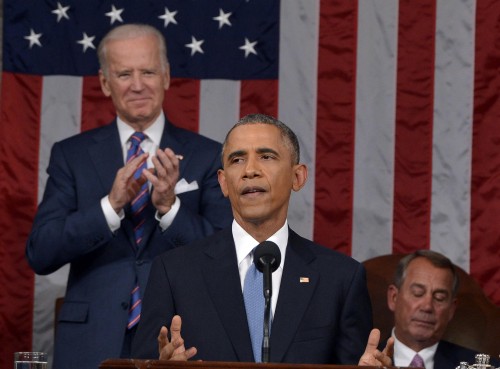In Tuesday’s State of the Union address, President Obama proposed a radical shift in the structure of education at the national level. With a tone of idealism, he set forth the intention to provide all students in good standing two free years of community college. In response to this highly anticipated announcement, half of the room stood in applause, while the other half sat firmly in their seats. Unsurprisingly, standers and sitters divided along party lines, with democrats welcoming the proposal and republicans opposed.
In theory (and in general) I’m with the standers on this issue. In practice, the issue is complicated and I have some deep concerns— concerns that stem from troubling trends within higher education. If I had to locate myself among the split-level congressional crowd, I would be out of my seat, but remain in an awkward and uncomfortable squat.
My discomfort stems from what I see as a larger trend in higher education: a move towards credentializing at the expense of educating. It is this credentializing shift that is also at the heart of my conflicted feelings about “online” colleges and universities. And I have little doubt, universal access to college will require digital mediation.
Let me be clear about a few things. I am not against digitally mediated educational opportunities. More than that, I fully support a highly educated public, and I am more than willing to pay through tax dollars, increased teaching loads, and fewer personal resources, in order to make education accessible to everyone who seeks it. I believe with all of my heart and mind that two free years of college education is a noble cause, and would love to see us implement this in a meaningful way.
And yet, I remain unwilling to stand and applaud. Through my first hand experience within higher education, however modest (I’m in my second year of a tenure-track job, having finished my PhD in 2013), I’ve noticed a distinct trend—a focus on the product rather than the process. Jobs require credentials, colleges and universities are supposed to provide these credentials. In an environment where resources are relatively scarce, finite, and zero sum, institutions of higher education are incentivized to crank out degrees, more so than cultivate sophisticated and thoughtful citizens.
The implications of this incentive structure have played out across the higher education landscape. Grade inflation acts as a simple but powerful metric of this trend. On a personal level, I recently spoke with a graduating senior at my university who was writing her first full-length paper. It wasn’t even for a regular course. It was for me, through an independent study. In this vein, my qualifying exams as a PhD student were significantly less rigorous than those of my committee members. I answered questions only from my areas of specialty, while foregoing a general theory/methods exam[1]. But it is in the (often for-profit )online education market that credentializing is taken to its logical extreme.
Credentializing is the open secret of the online education market. It is the justification for hiring low-paid adjuncts and mechanizing the job of teaching, requiring instructors to use pre-selected textbooks and pre-made lectures. It is behind the problem of online universities’ struggle to place their students into sustainable full-time jobs. It is what drives the threat of lost accreditation, a lurking potential for a large host of online schools which hang onto education—as opposed to credentializing— by mere threads.
My fear is that the implementation of subsidized community college will follow the trend of credentializing more generally, and in practice, most closely follow the online education model. The threads that save institutions of education from falling fully into institutions of credential distribution can be all too easily cut.
This is not to say that digitally mediated teaching and learning is inherently deficient. On the contrary, the sorry state of online education is neither natural nor inevitable. Digitally mediated learning harbors strong potentials for access, enrichment, and personal and cultural advancement. And indeed, digital tools can—must—be integral in expanding access to education.
But I remain squatting. Not just uncertain, but primed to jump—into debate, into protest, into planning meetings, and, always, into classrooms of all types.
Follow Jenny Davis on Twitter @Jenny_L_Davis
Pic: Source
[1] Qualifying exams are essay-based tests that PhD students take at the end of course work, before starting their dissertations. The requirements vary greatly across universities, between departments, and even between individual faculty members within a department. My experiences, however, and those in and around my cohort, are generally less strenuous than those of the generations before.


Comments 3
Higher Education’s Credentializing Trend - Treat Them Better — January 23, 2015
[…] Higher Education’s Credentializing Trend […]
carol — January 31, 2015
Your concerns are already being realized with diploma mills like Vista College. Their goal seems to be to collect pricey tuitions and hand out diplomas.Having interviewed a few "graduates" from some of these two year colleges, I was appalled to realize that the interviewees had even graduated from high school. I am convinced that the President's proposal will only flood the education market with these substandard institutions.